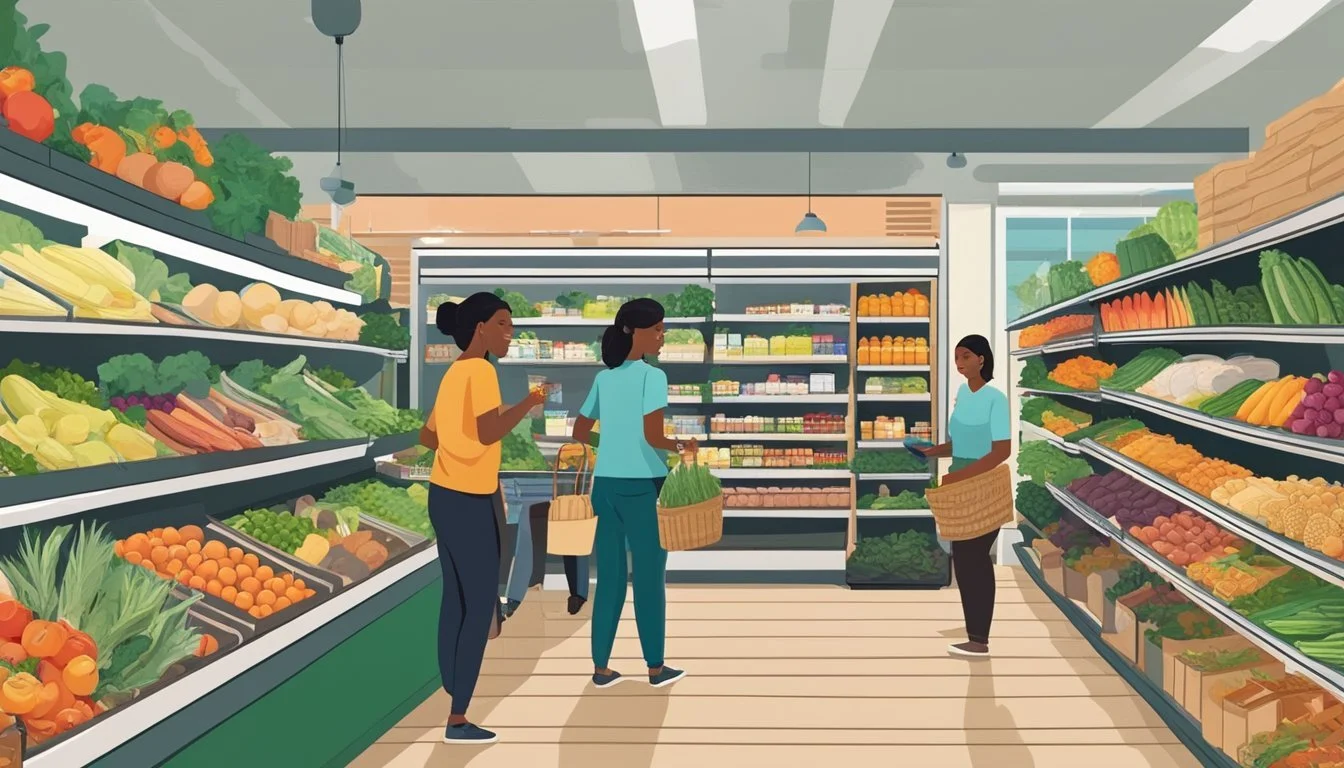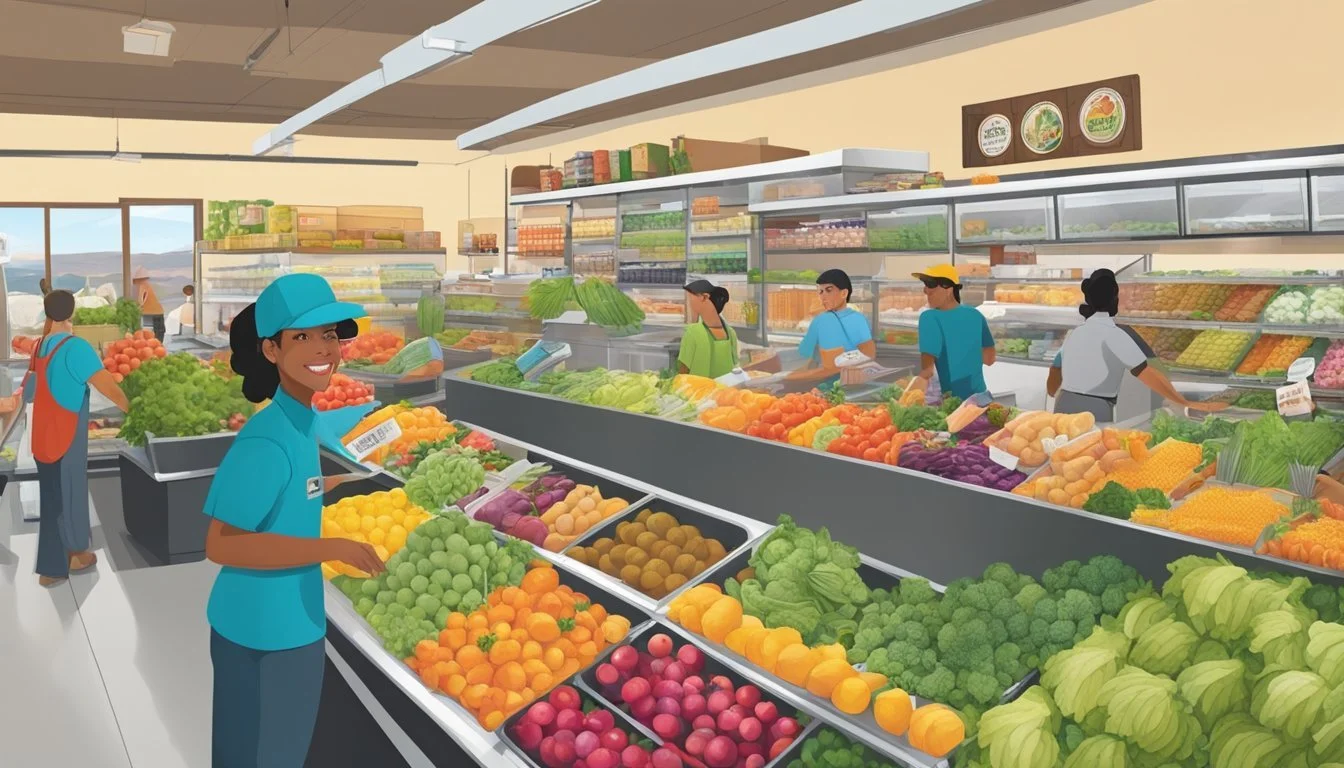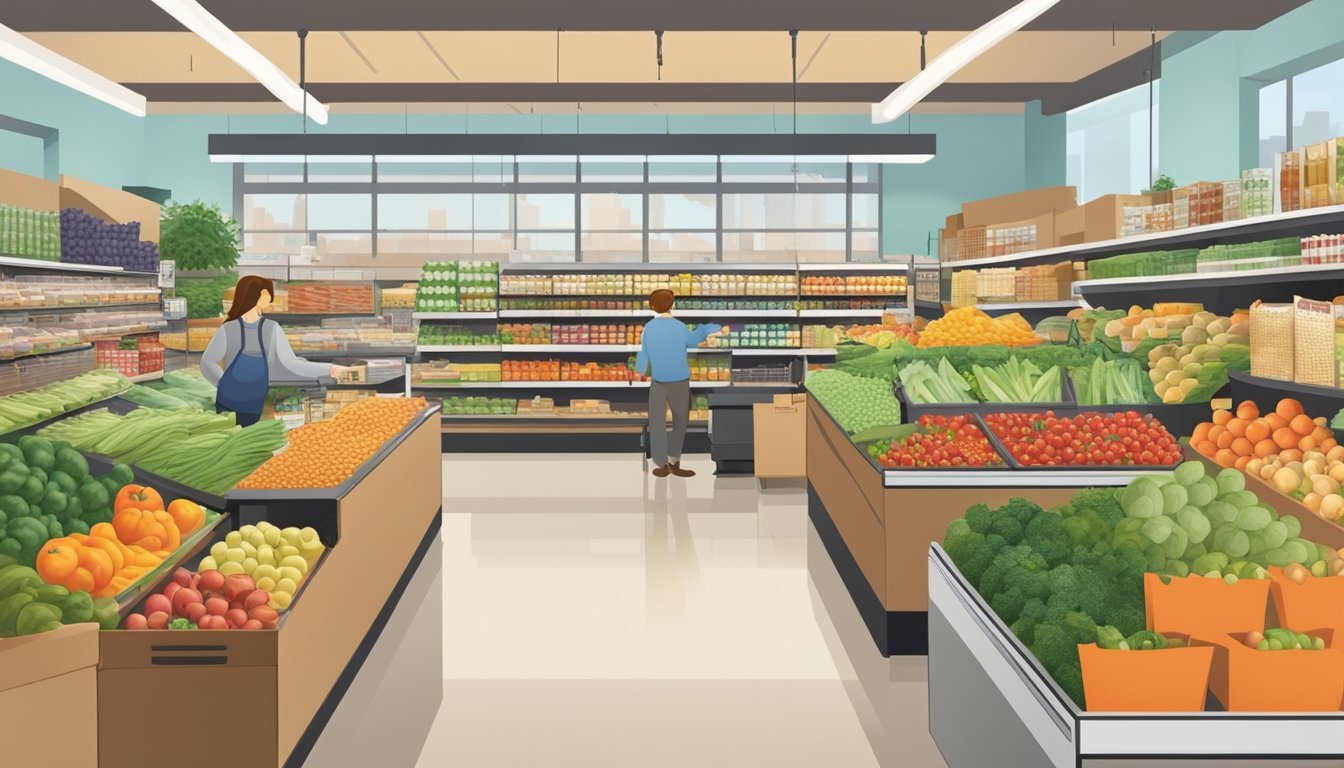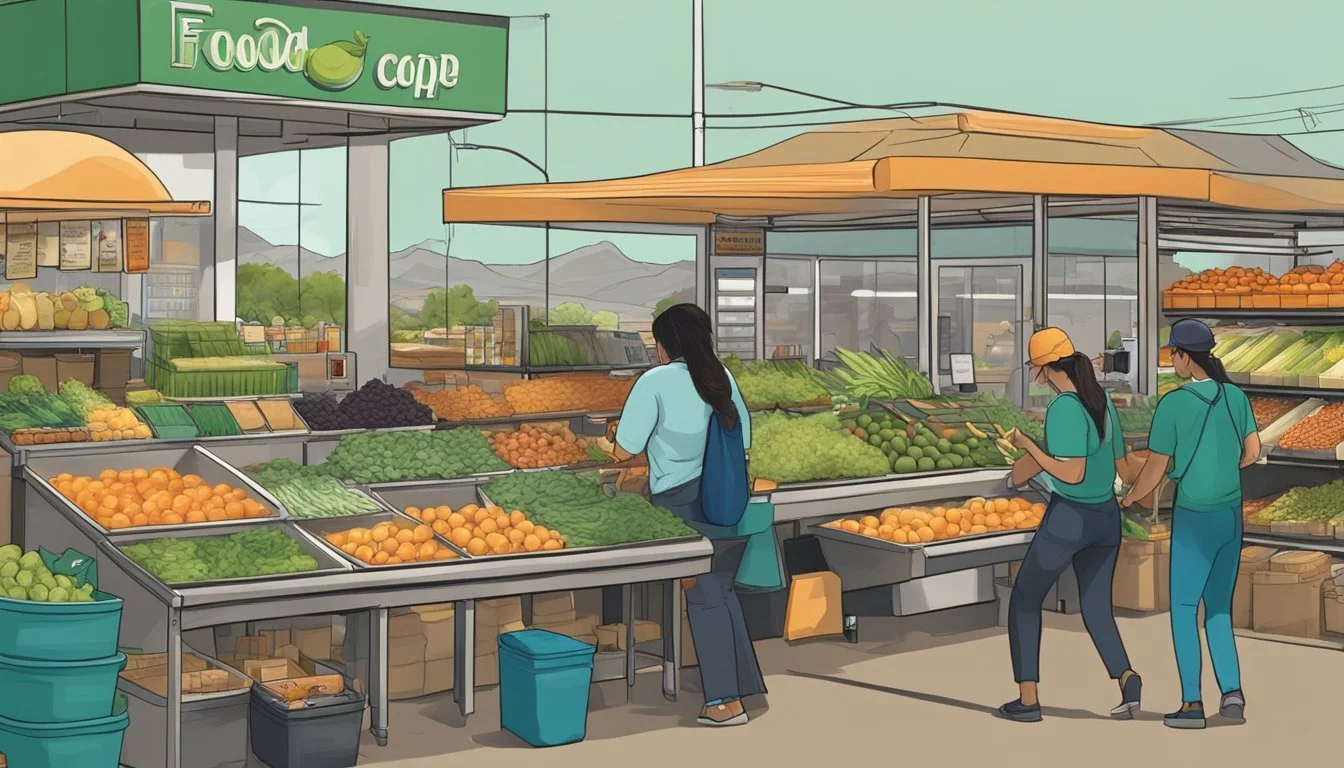Guide to Food Co-Ops in El Paso, TX
Your Local Shopping Resource
El Paso, Texas, boasts a growing number of food cooperatives—community-centered organizations where people can access local and organic produce. These food co-ops operate as multiple-farm Community Supported Agriculture (CSA) programs and storefronts, offering an alternative to traditional grocery stores. They focus on providing consumers with fresh, diverse, and locally-sourced items while supporting central Texas farmers and fostering a sense of community.
One notable example is the Mountain View Market Co+op in nearby Las Cruces, NM, which exemplifies regional commitment to real food and community engagement. Additionally, Ciudad Nueva's neighborhood food co-op in El Paso not only supplies fresh produce but also serves as a hub for community interaction and support. Through these cooperative models, residents not only obtain nutritious foods but also contribute to the sustainability of their local economies.
The push to establish more natural food co-ops in El Paso has gained momentum, indicating a strong community interest in healthier food options and a connected, sustainable food system. These initiatives point to a more significant movement within the city toward food security, local empowerment, and communal well-being.
History of Food Co-Ops in El Paso
Food cooperatives in El Paso, TX, embody a tradition of communal engagement and support. These collaborative entities serve both as community centers and critical access points for nutritious food options. El Paso's food co-ops have evolved from simple beginnings to become integral parts of the local economy, often focusing on serving nonprofit clients and lower-income neighborhoods.
In recent years, a noted co-op, Ciudad Nueva’s neighborhood food co-op, began addressing the need for affordable and accessible food in El Paso. Around October 2018, the co-op emerged as a hub for sharing food and fostering community spirit. Initially aiding about 20-30 families, it showcased rapid growth by operating multiple days per week.
The neighborhood concept reflects an acknowledgment of El Paso's rich culinary practices, tied closely to its cultural and economic realities. It’s a microcosm of a broader movement that values local involvement, with each co-op functioning not merely as a place of commerce but also a community cornerstone.
The city’s co-ops today form part of a national picture, with groups like National Co+op Grocers (NCG) illustrating a collective aim to strengthen food systems. Their efforts are channeled toward creating an inclusive, community-focused economy that leans on sustainable and environmentally-friendly practices.
El Paso's co-op history, although less documented than larger movements, is consistent with the broader narrative of cooperatives. They are spaces of resilience and resourcefulness, tailored to meet the unique demands of their community members.
Benefits of Joining a Food Co-Op
Joining a food co-op in El Paso offers numerous benefits to its members. For one, there is a significant focus on healthy eating. Members gain access to nutritious and often organic products that include fresh, local produce. This supports not only individual health but also the local agricultural community.
Discounts are another tangible advantage. Members can enjoy lower prices on items compared to traditional grocery store offerings. Furthermore, many co-ops provide additional financial perks such as patronage refunds, where a portion of what members spend is returned to them, fostering a cycle of savings.
Embracing the social aspect, co-ops thrive as hubs for like-minded individuals who value community and nutrition. By being a part of a food co-op, members directly contribute to a sustainable ecosystem that prioritizes collective well-being over profit. These organizations often undertake business practices that are beneficial for both people and the planet.
In a table format, here are the key benefits:
Benefit Description Healthy Options Access to a variety of fresh, nutritious, and organic produce. Discounts Reduced prices and potential patronage refunds for members. Local Impact Support for the local economy and agriculture. Community Engagement Involvement in a community with shared values around food and sustainability.
Becoming a member is more than just a transaction; it is an investment in one's health and community.
How Food Co-Ops Work
Food co-ops in El Paso operate based on a membership structure, governed by democratic principles, and sustain themselves through a well-defined financial framework. They are collaborative enterprises where members have a say in operational decisions and benefits are shared.
Membership Structure
Members of a food co-op are also its owners, with every individual having an equal stake and a voice in the co-op's operations. Membership often requires paying an annual due, which can vary in amount, and may include options for working memberships that provide additional benefits such as discounts on purchases.
Operations and Governance
Food co-ops are democratically governed, typically following a board-management structure. Operational decisions, from sourcing products to setting hours, are made with member input either directly or through elected representatives. The governance model ensures that the co-op adheres to the collective interests of its members.
Regular Meetings: Members often gather regularly to discuss and vote on significant issues.
Leadership: A board elected from the membership oversees the co-op’s manager, who handles day-to-day operations.
Financial Framework
A food co-op's financial health is managed transparently. With the co-op’s non-profit status under section 501(c)(3), it's required to file Form 990, 990-EZ, or 990-PF with the IRS, which provides insight into the co-op’s finances to the public.
Revenue: Primarily generated through sales of food products to members.
Financial Disclosure: Regular financial reporting keeps members informed on the co-op’s health.
By understanding the unique elements involving membership, governance, and finances, individuals gain insight into the function and benefits of food co-ops in El Paso.
Local Food Co-Ops in El Paso
El Paso, TX, boasts a selection of food co-ops that cater to the community's need for local, fresh, and often organic produce. These cooperatives serve as a bridge between local vendors and residents, emphasizing the importance of sustainable food practices and community support.
Mountain View Market Co+op, located in Las Cruces just outside El Paso, is the region's premier cooperative for natural foods. It holds the distinction of being the largest such establishment in Southern New Mexico, focusing on locally sourced products and offering organic options.
In the heart of the city, Ciudad Nueva’s Neighborhood Food Co-op embodies community spirit by sharing food and fellowship. It successfully operates a program that serves numerous local families with access to fresh, healthy food choices, underscoring a commitment to community well-being and involvement.
Here is a brief overview of the food co-ops in the El Paso area:
Food Co-op Location Notable Features Your Health Source Denton, TX (Near El Paso) Organic fruits and vegetables, delivery and pickup available Mountain View Market Co+op Las Cruces, NM (Near El Paso) Largest natural foods cooperative in Southern New Mexico, local products Ciudad Nueva Neighborhood Co-op El Paso, TX Community-focused, fresh local food, supports many families
El Paso's co-ops are more than just shopping venues; they are hubs of community engagement that foster a connection to the local food ecosystem. By purchasing from these establishments, residents support local agriculture and receive the benefits of nutritious, farm-fresh food.
Comparing Food Co-Ops with Regular Grocery Stores
Ownership and Operation A food co-op is typically owned and operated by its members, who share in the benefits and responsibilities. Each member has a stake in the co-op, giving them a voice in decisions. In contrast, a regular grocery store is usually owned by an individual, family, or corporation, with profits primarily benefiting the owners or shareholders.
Product Selection Food co-ops often emphasize local and organic produce, and they may offer unique or artisanal products not found in regular grocery stores. Regular grocery stores tend to have a wider selection of mainstream brands and products, including a full range of conventional and organic items.
Pricing and Deals Co-ops can offer members special discounts, deals, and dividends based on patronage. Regular grocery stores have sales and promotions that are available to anyone, and prices may be lower due to larger-scale operations.
Community Focus Food co-ops frequently support local growers and producers, which bolsters the community’s economy. Regular grocery stores may source products more broadly, which can mean less local economic impact.
Access Not all co-ops require membership to make a purchase, whereas grocery stores are open to the public with no membership necessary.
Summary Table
Criterion Food Co-Op Regular Grocery Store Ownership Community Members Individuals or corporations Product Selection Local, Organic Focus Broad, Conventional Brands Pricing Member Deals Open to Public Sales Community Impact Strong Local Support Varied Local Engagement Access Members and Non-members Public Access
Food co-ops and regular grocery stores each serve customers with different models of operation and focus. They both play important roles in providing access to groceries and produce, yet they cater to different consumer needs and preferences.
Types of Products Offered by Food Co-Ops
Food co-operatives in El Paso prioritize a diverse range of products catering to health-conscious and environmentally aware consumers. They provide a hub for organic, locally grown produce and cater to specialized dietary needs; some even extend their stock to include household essentials.
Organic and Locally Sourced
Food Co-ops in El Paso offer an array of organic and locally sourced products. The focus is on fresh produce, including fruits and vegetables grown by regional farmers. This not only supports the local economy but also ensures that consumers have access to seasonal produce that's typically fresher and has a lower carbon footprint than food shipped from distant locations.
Produce: A variety of seasonal fruits and vegetables.
Organic: Items certified organic, free from synthetic pesticides and fertilizers.
Specialty Diet Products
For those with specific dietary needs, such as gluten-free or vegan, co-ops provide an array of suitable options. The shelves are stocked with specialty diet products, making it easier for consumers who follow these diets to find a selection of compatible foods in one place.
Gluten-Free: A selection of breads, cereals, and pastas.
Other Diets: Including dairy-free, nut-free, and plant-based alternatives.
Household Goods
Aside from food, food co-ops in El Paso also feature a range of household goods. These products are chosen with the same ethical and health-conscious criteria as their edible counterparts. Consumers can find environmentally friendly cleaning products and other household necessities that align with a sustainable lifestyle.
Eco-Friendly: Biodegradable, non-toxic cleaning supplies.
Essentials: Reusable containers, locally-made soaps, and other sustainable household products.
Membership Benefits and Responsibilities
Becoming a member of a food cooperative in El Paso, TX, offers individuals the chance to enjoy a range of benefits while fulfilling certain responsibilities to maintain the cooperative's ethos and operation.
Benefits for Members:
Product Discounts: Members often receive discounts on products, making it more economical to purchase quality, locally-sourced goods.
Store Amenities: Dedicated amenities in the co-op store may be available exclusively to members.
Participation in Governance: Members may have the right to vote on important decisions, influencing the management and direction of the co-op.
Sense of Ownership: With membership, individuals obtain a tangible stake in the co-op, instilling a sense of belonging and pride.
Responsibilities of Members:
Community Engagement: Members are encouraged to engage with community activities, such as food waste reduction programs and distribution efforts.
Volunteering: Offering time for tasks like food pick-up, inspection, and distribution helps the co-op thrive.
Financial Commitment: Members might need to pay an initial investment or annual fees to support the co-op's financial sustainability.
Promoting the Co-op: As part-owners, members are expected to promote the co-op within their networks to foster growth and sustainability.
In Summary:
Membership in an El Paso food co-op is designed to empower individuals to contribute to their community's well-being while gaining personal and financial benefits. Through active participation and support, members reinforce the cooperative's mission to provide access to high-quality food and support local agriculture.
Community Involvement and Social Impact
Food co-ops in El Paso, TX, have become hubs for community engagement and local empowerment. They often rely on the collective effort of community members, who contribute not just financially through donations but also by volunteering their time and skills. The impact of these food co-ops extends beyond providing affordable food options; they serve as vehicles for education and social change.
Ciudad Nueva, a notable example, has demonstrated significant community involvement by growing its services within the Rio Grande neighborhood. Originally serving 20-30 families twice per week, it has expanded and integrated additional support like job referrals and emergency assistance.
Aspect Contribution Donations Fund programs and food distribution Volunteering Operate co-ops and support events Education Inform about healthy eating and financial literacy
The United Way of El Paso County, through its Community Impact Fund, supports these initiatives by facilitating a network of agencies that aim to enhance the quality of life for El Pasoans. These agencies work across various sectors including education, health, financial stability, and basic needs.
Social media platforms, particularly Facebook pages, have played a crucial role in disseminating information and rallying support. They enable co-ops to share updates, coordinate events, and mobilize resources efficiently. The real-time interaction also fosters a sense of community online that mirrors the collaborative spirit found within the co-ops.
Cause IQ metrics may be utilized to assess and quantify the impact of food co-ops, though specific data from this tool about El Paso food co-ops isn't provided. Nonetheless, food co-ops' transparency and accountability are essential in maintaining trust and support from the community. This data-driven approach can optimize their operations and enhance their social impact.
Finding and Joining a Food Co-Op
When seeking a food co-op in El Paso, TX, individuals have several avenues to explore. A food co-op typically operates as a cooperative business owned by its members who share its benefits and responsibilities. Joining one involves paying a membership fee, which can often yield financial rewards, a voice in co-op governance, and a deeper connection to the source of one’s food.
Locating a Food Co-Op:
Start with local directories or platforms like LocalHarvest to find listings near El Paso.
Utilize social media, such as Facebook pages dedicated to local food movements.
Steps to Membership:
Research: Identify local food co-ops and understand their specific membership requirements.
Visit: Take the time to visit the co-op, observe their operations, and talk to current members.
Apply: Complete an application for membership, which usually includes a fee.
Considerations:
Members should be prepared for active participation in the co-op.
Membership often entails benefits like discounts and a vote on important matters.
Quick Fact Detail Membership Fee Required, varies by co-op Member Involvement Active roles may be available or expected Decision-Making Members typically have a vote in co-op governance Local Involvement Co-ops often source products from local producers
It's essential for potential members to understand that a food co-op is more than just a grocery store—it's a community they're becoming part of, which can enrich their shopping experience and contribute to the local economy.
Marketing and Outreach Strategies
Effective marketing and outreach strategies are crucial for food co-ops in El Paso, TX, as they serve to enhance brand awareness and foster community involvement.
Social Media Presence
Food co-ops in El Paso can leverage social media platforms, such as Facebook, to build their brand and connect with their community. An active Facebook page serves as a valuable tool for sharing news, event information, and engaging content related to food co-op activities. Highlighting member stories and community impact can encourage participation and membership growth.
Content Sharing: Share posts related to food distribution, member experiences, and the role in reducing food waste.
Promotion: Use Facebook ads targeted to El Paso residents to increase the visibility of the food co-op.
Community Engagement
Community engagement is a cornerstone for food co-ops, involving the community in various stages from food pick-up to distribution. By engaging members in these processes, co-ops ensure a deeper connection to their mission.
Volunteer Programs: Create opportunities for community members to contribute to the co-op's operations and decision-making processes.
Events: Host and promote events that encourage local involvement and foster relationships between the co-op and its members.
It's essential for co-ops to maintain a transparent and consistent line of communication and to tailor their outreach to resonate with the local community's culture and values.
Financial Management of a Food Co-Op
Effective financial management is a cornerstone for the success of any food co-op in El Paso, TX. Financial data cleaning is the first critical step in managing finances, ensuring accuracy in the accounts by eliminating duplicate entries and correcting errors. This process lays the foundation for robust financial analytics, which empowers a food co-op with the insights needed to make informed decisions.
Categorization and classification of financial transactions streamline the accounting process, simplifying the way expenses and income are tracked and reported. It enables the co-op to have a clearer understanding of its financial health:
Income: sales revenue, membership fees, fundraising
Expenses: inventory costs, utilities, staff wages, rent
By categorizing transactions, a food co-op can better manage its budget and forecast future financial needs.
Tax-exempt organizations, such as non-profit food co-ops, benefit from different financial regulations. It is essential they maintain comprehensive records to comply with IRS standards and retain their tax-exempt status. They typically must demonstrate that they are operating within the scope of their mission to provide community benefits.
Lastly, utilizing up-to-date data and technology for financial analytics helps the co-op to detect trends, allocate resources efficiently, and optimize operations—all with the goal of sustainability and community service in mind. These tools can support strategic decisions, from pricing and inventory management to expansion and outreach efforts.
Proper financial management ensures not only the survival but also the thriving of a food co-op amid the challenges of the dynamic El Paso market.
Challenges and Solutions for Food Co-Ops
Food co-ops in El Paso face unique challenges. The primary issue is maintaining a balance between supporting local vendors and managing operational costs. As local vendors often produce on a smaller scale, their prices can be higher compared to large-scale commercial suppliers. However, food co-ops have the advantage of directly contributing to the local economy and providing an outlet for traditional foods.
To address this, food co-ops can implement tiered pricing models to accommodate different vendor sizes, ensuring a wide variety of local products while keeping items affordable for consumers. They can also foster relationships with vendors by offering cooperative membership benefits or prioritizing those who supply traditional and culturally significant foods.
Employee training and retention are another significant aspect, as knowledgeable staff are essential to a food co-op's operation. To retain skilled employees, co-ops could provide competitive benefits and foster a team-oriented environment, which may include training programs that emphasize the importance of traditional foods and community engagement.
List of Solutions for Common Co-op Challenges:
Implement tiered pricing for products.
Offer discounts or a loyalty program.
Vendor Support:
Prioritize local and small-scale vendors.
Provide membership benefits to suppliers.
Employee Retention:
Competitive wages and benefits.
Create comprehensive training programs.
Cultural Relevance:
Stock and promote traditional foods.
Educate both employees and consumers on the significance of local food customs.
Through these efforts, food co-ops in El Paso can serve as models of economic resilience and cultural sustainability, all while facing the issues inherent to the cooperative business model.
Case Studies: Successful El Paso Food Co-Ops
In El Paso, Texas, food co-ops serve as pivotal entities in bolstering community spirit and ensuring access to nutritious food. These cooperative efforts exemplify a blend of success and social responsibility.
One notable example of a thriving food co-op in El Paso is Ciudad Nueva's neighborhood food co-op. Established for slightly more than a year, it has already had a profound impact on the community. Initially serving 20-30 families, this co-op operates twice per week, allowing for increased access to fresh food for those in the community.
Services Offered:
Twice-weekly operations
Aiding 20-30 families at inception
Another initiative, No Lost Food, tackles food insecurity while also addressing food waste. By redistributing surplus food such as bags of oranges, No Lost Food supports those in need, namely in response to declining SNAP benefits that have affected many El Paso residents.
Impact:
Reduces food insecurity
Mitigates food waste
The Food Co-op Initiative has also been instrumental in the success of food co-ops. The FCI Guide to Starting a Food Co-op positions itself as an invaluable resource, facilitating the inception of co-ops and empowering communities to establish their versions of these collaborative food distribution models.
Resources Provided:
Guidance for starting new co-ops
Nonprofit support through FCI
El Paso's initiatives reflect resilience in the face of food insecurity challenges, expected to rise in the forthcoming months. These food co-ops are not simply stores but are the lifeblood of community support systems, proving essential in the dynamic landscape of food accessibility.
Emerging Trends in Food Co-Operatives
Food cooperatives are adapting to changing consumer preferences and the evolving landscape of the food industry. One prominent trend is a shift towards health-focused offerings, including an expanded variety of salads and nutrient-dense ready-to-eat options.
Local and Organic Produce: They are capitalizing on the organic trend by sourcing local, organic produce to meet consumer demand for fresh, sustainable, and traceable food options. This not only supports local farmers but also minimizes the carbon footprint associated with long-distance transportation.
Collaborative Networks: Food co-ops are increasingly leveraging their collective power. By working together as a network, they achieve stronger bargaining power with suppliers, share best practices, and amplify their impact on the local and national food systems.
Consumer Education: They provide educational resources about healthy eating habits and the benefits of organic produce. This empowerment enables consumers to make informed choices aligning with their values.
Technology Integration: Adoption of technology for streamlined operations is apparent. They are incorporating inventory management systems and customer relationship management software to enhance the shopping experience while maintaining a community-oriented approach.
Trend Impact on Food Co-Ops Local, Organic Focus Increased support for local agriculture, better quality produce Collaborative Efforts Cost savings, unified advocacy, shared learning Consumer Education Informed purchasing decisions, healthier diets Technology Improved efficiency, better customer service
Food co-ops are embracing these emerging trends to stay relevant and provide value to their members, prioritizing health, sustainability, and community development.














